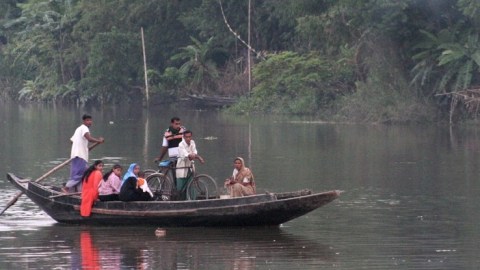Rising Seas Leave Nothing to Fight Over

South of the Sundarbans mangrove forest, in the Bay of Bengal, lies one of those tiny flecks of land at the center of endless negotiation between two countries—a little patch of ground whose ownership looks worth about five minutes’ negotiating, but which turned into an endless international quarrel.
The island appeared in 1970, after a cyclone remade the river delta. The Indian government dubbed the place New Moore Island, a new piece of India. Bangladesh says it’s the rightful owner of what is properly called South Talpatti island. No one from either country lives there, except the occasional member of India’s military, dispatched for a short time to show the flag. Still, there might be oil and gas under the place, and it’s in an area whose border has been disputed ever since independent India’s borders were fixed. So neither nation has given up its claim.
It was apparently a point of tension in the region, and for good reason: as they knew even in Shakespeare’s day, this kind of thing can get out of hand.
Well, no more worries: Global warming has submerged the problem, according to Jadavpur University’s School of Oceanographic Studies in Calcutta. Satellite images reveal that the whole island—once 110,000 square feet at low tide, its highest parts six feet above sea level—is now under water. Sea levels in the delta have been rising more quickly than ever in the past decade, says Sugata Hazra of the School of Oceanographic Studies.
Soon, he says, climate change is going to sink other islands in the bay—ones where people actually live. Some six million people in the Sundarbans region may soon be refugees, while people in the rich world talk about climate change in the future tense.





